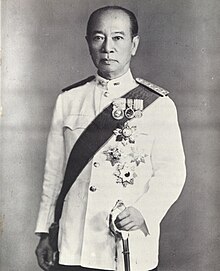This article needs additional citations for verification. (March 2023) |
Wichitwathakan | |
|---|---|
วิจิตรวาทการ | |
 | |
| Assistant to the Prime Minister | |
| In office 16 February 1959 – 31 March 1962 | |
| Prime Minister | Sarit Thanarat |
| Preceded by | Position established |
| Succeeded by | Position abolished |
| Secretary-General of the National Security Council | |
| In office 16 February 1959 – 31 March 1962 | |
| Prime Minister | Sarit Thanarat |
| Preceded by | Position established |
| Succeeded by | Phraya Srivisanvaja |
| Minister of Economic Affairs | |
| In office 6 December 1951 – 23 March 1952 | |
| Prime Minister | Plaek Pibulsonggram |
| Preceded by | Munee Mahasandana |
| Succeeded by | Bunkoed Sutantanon |
| Minister of Finance | |
| In office 29 November 1951 – 8 December 1951 | |
| Prime Minister | Plaek Pibulsonggram |
| Preceded by | Phra Manuphanawimonsart |
| Succeeded by | Pao Pienlert Boripanyutakit |
| Minister of Foreign Affairs | |
| In office 19 June 1942 – 18 October 1943 | |
| Prime Minister | Plaek Pibulsonggram |
| Preceded by | Plaek Pibulsonggram |
| Succeeded by | Direk Jayanama |
| Personal details | |
| Born | 11 August 1898 Uthai Thani, Siam |
| Died | 31 March 1962 (aged 63) Bangkok, Thailand |
| Spouses |
|
| Profession |
|
| Signature | |
Major-General Luang Wichitwathakan (also known as just Wichit Wichitwathakan) (Thai: หลวงวิจิตรวาทการ, วิจิตร วิจิตรวาทการ; Chinese: 金良) (11 August 1898[1] – 31 March 1962[2]) was a Thai politician, diplomat, historian, novelist, and playwright. He is credited with changing the name of the country from Siam to Thailand.
Luang Wichitwathakan was prominently engaged in politics and the modernization of Thailand and was in his time the most important figure in the establishment of Thai nationalism and Thai identity. He was the chief ideologue and creator of cultural campaigns during the pre-World War II military rule of Field Marshal Plaek Pibulsonggram.
- ^ Barmé 1993, p. 40
- ^ Barmé 1993, p. 1